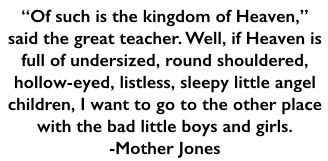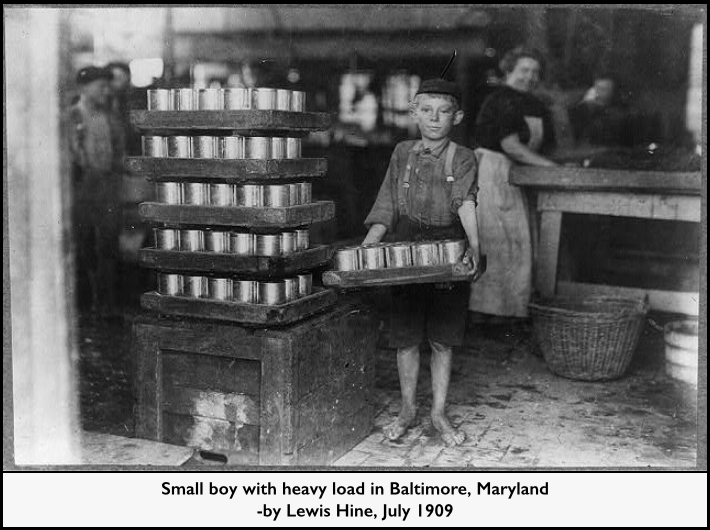
Hellraisers Journal, Tuesday October 9, 1917
Maryland Boss Has Heartache for Loss of Child Cannery Workers
From the Appeal to Reason of October 6, 1917:
“SUFFER LITTLE CHILDREN–.”
—–
W. E. Robinson, a Belair, Md., canner, is heartbroken because the Keating-Owen child labor law has forced him to employ men and women instead of the little children who formerly did the work in his factory. In a recent letter to a local newspaper he says:
Since the first of September [when the Keating-Owen Law became effective] I have not permitted these boys and girls to work in my factory. They are healthful, industrious youngsters, and the work they have been doing was very beneficial to them, mentally and physically. But my heart aches for them now. Their parents are all at work in the factory. Where are these husky boys and girls; what are they doing?
These unfortunate youngsters, bereft of their beloved jobs, exiled from the kindly shelter of Robinson’s cannery, their plight is indeed pitiful. Deprived of the life-giving labor, which was so “very beneficial to them, mentally and physically” doubtless their muscular little bodies are wasting away, and the once eager young minds have crumbled into mental and moral ruin.
No wonder that the gentle heart of W. E. Robinson, canner, “aches for them now.” Fathers and mothers are at work in the factory, the poor children are forced to while the weary days away at school or at some other doubtful resort; the portals of the blessed factory have been shut against them by the heartless advocates of the pernicious child-labor legislation.
Can’t you picture, as you read the above, the long lines of heart-broken youngsters coming to the factory each morning, and, learning that there is no light, pleasant work for them, trudging sorrowfully away to school? O, the pathos of it! And they are such little children!
The great heart of Robinson is breaking, it seems, because these children are free to roam the streets, their mothers being at work in the factory. May we respectfully suggest that the payment of a little more money to the fathers would permit the mothers to stay at home and care for their children?
And Mr. Robinson’s own children-where are they? Have they too been forced by this imbecile statute to leave the work which their loving father has pronounced so “beneficial to them, mentally and physically”? Let us drop a tear for the unfortunate progeny of Robinson.
———-
[Photograph added.]
SOURCE
Appeal to Reason
(Girard, Kansas)
-Oct 6, 1917
https://www.newspapers.com/image/67312884/
IMAGE
Child Labor, Baltimore Cannery, Lewis Hine, July 1909
http://www.loc.gov/pictures/item/ncl2004000722/PP/
See also:
Child Labor in the Canning Industry of Maryland
-note by Lewis W. Hine, July 1909
http://www.loc.gov/pictures/static/data/nclc/resources/images/canneries3.pdf
Lewis Hine (1874-1940)
https://en.wikipedia.org/wiki/Lewis_Hine
Keating-Owen Child Labor Act of 1916
https://en.wikipedia.org/wiki/Keating%E2%80%93Owen_Act
Keating-Owen Child Labor Act of 1916
https://www.ourdocuments.gov/doc.php?flash=false&doc=59
Note: the Keating-Owen Child Labor Act was signed by President Wilson on Sept 1, 1916 and became effective on Sept 1, 1917.
The New York Times
(New York, New York)
-Sept 2, 1916
http://query.nytimes.com/gst/abstract.html?res=9D01E1D61E3FE233A25751C0A96F9C946796D6CF&legacy=true
SIGNS CHILD LABOR BILL.
—–
President [Wilson] Says It Will Mean
Health and Vigor to the Country.
We Will Sing One Song
We will sing one song of the children in the mills,
They’re taken from playgrounds and schools,
In tender years made to go the pace that kills,
In the sweatshops, ‘mong the looms and the spools.
-Joe Hill

